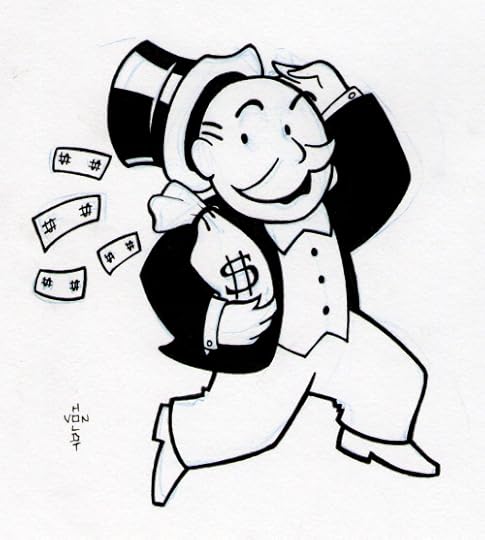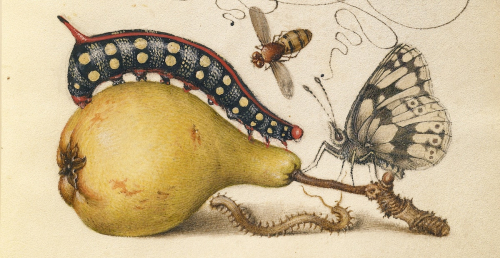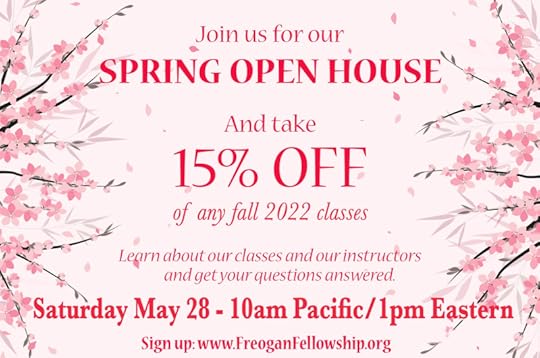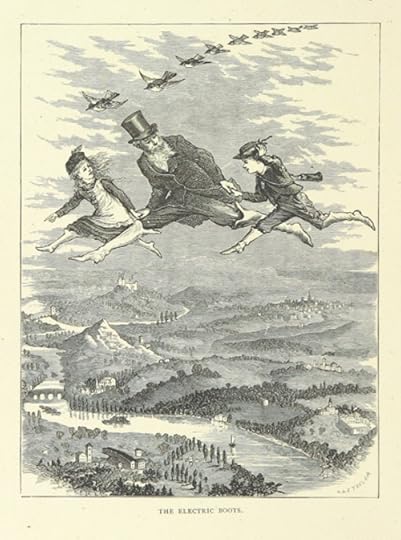Bretigne Shaffer's Blog, page 4
July 30, 2022
Most of my Blogging is on my Substack Now
...just a quick note to say that you'll find more of my commentary and other posts over on my Substack Publication, "On the Banks."
I still keep this blog updated with big things, and podcast episodes, etc. but if you want all of my commentary, that's where you'll find it.
Thanks for reading!





 Related StoriesI'm Starting A Private Substack Publication - For Those Who Are Serious About Building SolutionsI speak with Kerry McDonald about Freogan Fellowship Learning, and our escape from CaliforniaWTMWD #80: My Mutual-Aid Vision for the Future, and Fighting Back Against Medical Tyranny - with Susan May
Related StoriesI'm Starting A Private Substack Publication - For Those Who Are Serious About Building SolutionsI speak with Kerry McDonald about Freogan Fellowship Learning, and our escape from CaliforniaWTMWD #80: My Mutual-Aid Vision for the Future, and Fighting Back Against Medical Tyranny - with Susan May
When the Good Guys Get it Wrong
Image: Public Domain
From my article on LewRockwell.com today:
Toby Rogers has been one of the heroes of the medical-freedom movement since before most Americans knew there was a need for a medical-freedom movement. (His cost-benefit analysis of the Covid-19 vaccines is just one example of what he has contributed here.) He recently wrote a lengthy post in which he asks, essentially, “since both free markets and the progressive regulatory state have failed, what’s next for humanity?”
My reply to Toby follows.
Toby,
I hope you are sincere in welcoming corrections. Because there are some fundamental errors here, and I hope you will be open to hearing about them.
Let me start by saying that there is a story about free markets that is told to everyone who goes through a government school in America (and I imagine elsewhere). The story goes something like this: “Free markets are all well and good in theory, but in practice they produce monopolies that are no longer accountable to their customers and must be reined in by the government.”
This story is a lie. And if you understand why the government lies about all the other things it lies about, I think you’ll understand why it has an interest in perpetrating this lie too.
With that in mind:
1. You say: “The dirty little secret of classical liberalism is that it came to depend on both slavery and colonial empire to infuse wealth into the system.”
In fact, colonial empire was a drain on the British economy. Yes, it made a few people – “John Company”, and other cronies, along with the crown itself – very wealthy. But it did so at the expense of everyone else in Britain.
This book presents an accounting of all of this. From the description:
“…empire profits were earned at a substantial cost to the taxpayer. [The authors] depict British imperialism as a mechanism to effect an income transfer from the tax-paying middle class to the elites in which the ownership of imperial enterprise was heavily concentrated, with some slight net transfer to the colonies in the process.”
The reality is that both the ideals of classical liberalism, and the economic interests of the population as a whole, were very much at odds with British imperialism, and the mercantilist system – which was precisely what Adam Smith addressed in his “Wealth of Nations.”
2. You say: “…and “Adam Smith’s famed “butcher, baker, and brewer” got rich from being downstream of the enormous wealth generated when Scotland cornered the market for new world tobacco (which was slave-grown…”
I’m not sure what point you’re trying to make here. That markets cannot function without an assist from slavery? But that’s patently untrue. You must recognize that the world is overflowing with examples that contradict that claim. So what are you saying?
3. Your description of progressivism:
“Progressivism was a reaction by the middle and upper classes against the failures of both liberalism and Marxism while attempting to retain the best aspects of both — seeking to preserve individual liberties while using the state to impose limits on corporate power. Progressive muckraker Upton Sinclair described the disgusting practices of meat packing plants in The Jungle and this led to the Federal Meat Inspection Act of 1906. Support for anti-trust action to break up large monopolies was another hallmark of progressivism.”
To begin with, “The Jungle” was completely made-up fiction. Lawrence Reed has written a thorough expose of this book and the mythology around it.
He writes:
“…historians with an ideological axe to grind against the market usually ignore an authoritative 1906 report of the Department of Agriculture’s Bureau of Animal Husbandry. Its investigators provided a point-by-point refutation of the worst of Sinclair’s allegations, some of which they labeled as “willful and deliberate misrepresentations of fact,” “atrocious exaggeration,” and “not at all characteristic.””
and:
“According to the popular myth, there were no government inspectors before Congress acted in response toThe Jungle, and the greedy meat packers fought federal inspection all the way. The truth is that not only did government inspection exist, but meat packers themselves supported it and were in the forefront of the effort to extend it so as to ensnare their smaller, unregulated competitors.”
It’s worth reading the whole piece by Reed, to get the full sense of the extent to which this novel really was nothing more than anti-capitalist propaganda. (There’s a reason it is required reading in so many government schools.)
More broadly, the myth that government regulation was borne of a desire to “impose limits on corporate power” is simply not true. The historical reality is that established businesses not only supported regulation of their industries, but were instrumental in setting up the regulatory state.
... Read the rest here.





 Related StoriesWTMWD #80: My Mutual-Aid Vision for the Future, and Fighting Back Against Medical Tyranny - with Susan MayI'm Starting A Private Substack Publication - For Those Who Are Serious About Building SolutionsWTMWD #79: Can Liberty Dollar Save the World?
Related StoriesWTMWD #80: My Mutual-Aid Vision for the Future, and Fighting Back Against Medical Tyranny - with Susan MayI'm Starting A Private Substack Publication - For Those Who Are Serious About Building SolutionsWTMWD #79: Can Liberty Dollar Save the World?
June 17, 2022
WTMWD #80: My Mutual-Aid Vision for the Future, and Fighting Back Against Medical Tyranny - with Susan May
I was interviewed by Susan May, the founder of “RiseUP with Susan May” and the RiseUP community, and creator of the Facebook group “Gather and Get Moving with Susan May”, a "...safe place for medical freedom advocates to connect and be inspired to action."
Susan and I talk a little about my own history, and about my experience fighting medical tyranny while in the hospital with our daughter. We also talk about my vision for a Mutual-Aid society and community dedicated to caring for those with special needs.
My Freogan Fellowship website is here.





 Related StoriesI'm Starting A Private Substack Publication - For Those Who Are Serious About Building SolutionsIt's Easter Again and AlwaysI speak with Kerry McDonald about Freogan Fellowship Learning, and our escape from California
Related StoriesI'm Starting A Private Substack Publication - For Those Who Are Serious About Building SolutionsIt's Easter Again and AlwaysI speak with Kerry McDonald about Freogan Fellowship Learning, and our escape from California
May 28, 2022
I'm Starting A Private Substack Publication - For Those Who Are Serious About Building Solutions
A few years ago, I had an idea. It was more than an idea - it was a compulsion. It was an urgently felt need to create a space where people who care about the human flourishing that happens when we are free could come together.
That was it. Not a plan for saving the world, just a place where we could hang out with each other, share our ideas, commiserate, and feel at home. And maybe, by virtue of doing all of this, we would come up with some ways to make a real difference in the world. Or maybe we would just feel a little less alone in that world.
I spent some time brainstorming with a friend about setting up some kind of platform for this, and finally decided to launch my idea as a podcast. And in March of 2020 - the week that California Governor Gavin Newsom decided to forcibly shut down our lives - I recorded my first episode, with Jeffrey Tucker, then with AIER, and soon to become one of the brightest lights in the battle against Covid tyranny. I’ve recorded many more episodes since then, with some of the best and most interesting advocates of liberty, at a time when human freedom is under unprecedented assault all around the globe.
I’m proud of my podcast. But it’s not quite what I set out to create. Mostly: It’s not very interactive. And so after a lot more brainstorming, I’ve decided to launch a new online community: Building Parallel Solutions. It’s a little different from my original idea, in that it is focused on creating solutions rather than just hanging out together. (Although there’s certainly room for that too.)
We’re starting out on Substack, as a private publication, I’ll be adding a private group on a social-media platform (probably MeWe), and we will also have occasional online video meetings. I will also be adding a paid membership option for those who want a little more direct support in creating solutions - I’ll post more about that later.
For now though, I think that what I said in my podcast manifesto fits nicely here:
It's the "nearly" that I'm interested in.
That–possibly very small, possibly not so small–number of people who can see and think for themselves. Who understand for themselves the difference between right and wrong, who don't need to have anyone else tell them that it is wrong to make another person your slave, or to lock another person in a cell when they have harmed no-one.
That's who I think of as the audience for my podcast ("What Then Must We Do?") You might call what I'm doing "preaching to the choir", but that's not it. I'm looking to reach the people who already recognize the problem, and who want to do something about it…
Maybe none of us is powerful enough to defeat the violence that is the state. Maybe even together we are not enough. But I am certain that if there is any hope for us at all, it lies entirely with this group of people.
Oh, and if I sound a little elitist, as if I think the "Non-Nearlys" are somehow inferior to the "Nearlys"… well, yes, I do. I do think that thinking for oneself is superior to not thinking for oneself. I also think that great masses of people who don't do much thinking for themselves, who don't have their own moral compasses, are one of the most deadly threats to all of humanity, and always have been.
But here's the thing about being among the "Nearly" (or, as Albert Jay Nock called them, the Remnant): it is a choice. Anyone can choose to start questioning what they have been taught their whole life. Anyone can choose to listen to their own conscience over the values and opinions that are fed to them by the people and institutions around them. Anyone can do this.
"What then must we do?" I honestly don't know. The forces arrayed against individual human beings just living their own lives as they choose seem more powerful and more entrenched than ever before. So, do I know how to change that? To defeat the people and institutions that wish to (and do) rule over us? No, I don't. But I do believe that between us–between all of the "Nearly"–we can figure this out.
“Building Parallel Solutions” is an invitation-only publication for people who are serious about - you guessed it - building parallel solutions. If that’s you, and you’d like to be a part of this, just drop me a line at [email protected], with “Please add me to BPS” in the subject line.
I look forward to seeing you there!





 Related StoriesI speak with Kerry McDonald about Freogan Fellowship Learning, and our escape from CaliforniaIt's Easter Again and AlwaysWTMWD #79: Can Liberty Dollar Save the World?
Related StoriesI speak with Kerry McDonald about Freogan Fellowship Learning, and our escape from CaliforniaIt's Easter Again and AlwaysWTMWD #79: Can Liberty Dollar Save the World?
May 26, 2022
Join the Open House for Free Minds, this Saturday!
From Freogan Fellowship Learning:
...and take 15% off of our fall classes!
We'll be giving everyone a chance to meet our instructors, hear about our classes, and get your questions answered - and to give us input. What classes would you like to see? What formats are best for you? We'd love to hear from you!
Join us this coming Saturday, 10:00am Pacific Time, 1:00pm Eastern Time, US. Just fill in the form on the website, and we'll send you a link to the meeting (the link will be at the bottom of the page.)
We look forward to seeing you there!





 Related StoriesWTMWD #77: Can Poetry Save the World? I Ask Joyce Beckett, Professor of Literature for Freogan FellowshipWTMWD #79: Can Liberty Dollar Save the World?It's Easter Again and Always
Related StoriesWTMWD #77: Can Poetry Save the World? I Ask Joyce Beckett, Professor of Literature for Freogan FellowshipWTMWD #79: Can Liberty Dollar Save the World?It's Easter Again and Always
April 20, 2022
WTMWD #79: Can Liberty Dollar Save the World?
I speak with Wayne and Kathy Hicks of Liberty Dollar Financial Association, about Liberty Dollar's history, and its rebirth as a Private Membership Association.
If you're looking for solutions to state-controlled money and financial systems, and if you're not entirely sure that Bitcoin (or any cryptocurrency) is the answer, then you need to listen to this episode. Liberty Dollar's new incarnation is truly revolutionary - and it doesn't stop at money and finance.
We talk about food security, the Liberty Dollar social network platform, and how the "outside-the-box" nature of LDFA can help to reclaim the economy from the world of crony corporatism.
You can find Liberty Dollar Financial Association here. (This is my affiliate link, so if you sign up using this link, I will get a little something.)
And LibertyNet, the social-network platform, is here.





 Related StoriesIt's Easter Again and AlwaysI speak with Kerry McDonald about Freogan Fellowship Learning, and our escape from CaliforniaWTMWD #77: Can Poetry Save the World? I Ask Joyce Beckett, Professor of Literature for Freogan Fellowship
Related StoriesIt's Easter Again and AlwaysI speak with Kerry McDonald about Freogan Fellowship Learning, and our escape from CaliforniaWTMWD #77: Can Poetry Save the World? I Ask Joyce Beckett, Professor of Literature for Freogan Fellowship
April 17, 2022
It's Easter Again and Always
I don't know whether or not Jesus rose from the dead after he was crucified.
There, I've said it.
It's one of the reasons I don't call myself a "Christian" - even though I believe in a "higher power" (which I am reluctant to call "God", only because I imagine it looks very different from what most people mean when they say "God"), and I believe in the teachings of Jesus Christ. But that's for another post.
Whether or not the actual Jesus actually came back from the dead - a possibility I don't discount (because I also believe in miracles) but about which I don't have certainty - the story of his rising is of tremendous importance to humanity, perhaps now more than ever before.
Why?
Because what we humans are, what we are at our essence, is not something that can be destroyed by death.
What we are is not defined by anything of the material world – despite the increasingly deafening (and fearful?) roar to the contrary. It's hard, even, to define it with words. But if I had to define it, I would say that it is love. Or maybe: the marriage of love, intelligence, and the power to create.
Many have said that we are in a spiritual war, and we absolutely are. It is a war against the forces of darkness and for those of us who are committed to the light, it can feel overwhelming and frightening and even hopeless. It sometimes seems inevitable that the powers of darkness will win.
They seek control of every aspect of our lives, everywhere on the globe, and it seems they will get it; They are able to convince our friends, neighbors, relatives, that it is in their best interest to take whatever experimental medical concoctions they come up with, and we have no choice but to watch as our friends, neighbors, relatives, go along unquestioningly; They tell us we are nothing but physical beings, machines, and that we should let them make us more machine-like, and it seems that they will.
But here's the thing:
The forces of darkness have only a very limited set of weapons at their disposal: Fear, lies, and violence. That's it.
These may seem like formidable weapons. They may seem impressive and frightening. But here's what we've got:
Love, truth, and the power to create.
The darkness can't create anything. It is the opposite of creation. Its tools can't be used to create anything worthwhile or lasting. You cannot build a flourishing civilization on lies. Or on fear, or on the threat of violence. That is not to say that those tools are not powerful or cannot accomplish anything at all. But they are not generative. They are not creative. And a society built with those tools does not allow for creativity, or real flourishing.
It is more important than ever to cultivate the tools of light. If you've never understood the importance of "turn the other cheek", understand it now: Feeding vengeance, hatred, and violence only feeds the darkness. Feeding love and forgiveness feeds the light and helps it to grow.
This is how we will win.
Because our powers are generative, and in accordance with the principles of life. The powers of darkness are only ever destructive. Darkness can control, and it can consume, but it cannot create.
The way we win is by remembering who we are.
My Christian friends may laugh at me for saying this, or they may shake their heads and despair for me, but I don't believe one needs to have certainty about Christ's rising from the dead in order to appreciate the meaning of Easter:
We humans are not simply material beings. What we are cannot be reduced to our physical bodies or the chemistry they are composed of. We are made of love and light, and our souls transcend our earthly existence. By knowing this and honoring it, we achieve victory over death, and victory over darkness.
Happy Easter.





 Related StoriesI speak with Kerry McDonald about Freogan Fellowship Learning, and our escape from CaliforniaLooking Forward to Appearing on Millenniyule 2021!WTMWD #77: Can Poetry Save the World? I Ask Joyce Beckett, Professor of Literature for Freogan Fellowship
Related StoriesI speak with Kerry McDonald about Freogan Fellowship Learning, and our escape from CaliforniaLooking Forward to Appearing on Millenniyule 2021!WTMWD #77: Can Poetry Save the World? I Ask Joyce Beckett, Professor of Literature for Freogan Fellowship
March 10, 2022
WTMWD #78: Not Crypto, Not Barter - Could XClave Bux Be the Alternative Currency We Need?
I spoke with Markus Allen, founder of XClave, a few months back, about his radical concept for creating independent private towns, including plans for an independent currency. At the time, I fully intended to post the episode in a timely manner.
Then our family decided to move out of California, and the next few months were a frantic blur.
Now, nearly 5 months later, this particular episode is more relevant than ever. With governments seizing the bank accounts of those who oppose their actions, and inflation starting to get very very real, we are in need of practical solutions to the problem of state inolvement in money and in financial systems. Could XClave Bux be the answer?
Listen to this episode and see what you think.
Check out XClave here.
...and XClave Bux here





 Related StoriesI speak with Kerry McDonald about Freogan Fellowship Learning, and our escape from CaliforniaWTMWD #77: Can Poetry Save the World? I Ask Joyce Beckett, Professor of Literature for Freogan FellowshipI Talk With Millennial Woes About Things We're Not Supposed To Talk About
Related StoriesI speak with Kerry McDonald about Freogan Fellowship Learning, and our escape from CaliforniaWTMWD #77: Can Poetry Save the World? I Ask Joyce Beckett, Professor of Literature for Freogan FellowshipI Talk With Millennial Woes About Things We're Not Supposed To Talk About
March 8, 2022
Enter to Win a Free Copy of "Annabel Pickering and the Sky Pirates"!
I'm giving away ten copies of my children's/fantasy/libertarian/maybe-not-just-for-children's novel "Annabel Pickering and the Sky Pirates, book 1: The Fantastical Contraption" - you can read what Kirkus Reviews had to say about Annabel here, and you can enter to win yours here:
Goodreads Book Giveaway

Annabel Pickering and the Sky Pirates
by Bretigne Shaffer
Giveaway ends March 31, 2022.
See the giveaway details at Goodreads.
Enter Giveaway





 Related StoriesI speak with Kerry McDonald about Freogan Fellowship Learning, and our escape from CaliforniaOur Classes Start Next Week!Sanctuary Jurisdictions for Medical Freedom - tomorrow at 1pm Pacific Time
Related StoriesI speak with Kerry McDonald about Freogan Fellowship Learning, and our escape from CaliforniaOur Classes Start Next Week!Sanctuary Jurisdictions for Medical Freedom - tomorrow at 1pm Pacific Time
February 15, 2022
I speak with Kerry McDonald about Freogan Fellowship Learning, and our escape from California
Image: Public Domain.
I spoke recently with Kerry McDonald, Senior Education Fellow at the Foundation for Economic Education and author of Unschooled: Raising Curious, Well-Educated Children Outside the Conventional Classroom, for her newly launched “LiberatED” podcast.
We spoke about my family’s reasons for leaving California, the challenges in pulling up roots - even for someone like myself, who has picked up and moved to new places and new cultures more times than I can count - as well as why it is so important to speak up and fight back from where we are too.
Kerry asked what advice I would give to families contemplating leaving one of the more tyrannical jurisdictions… and I do my best to give a helpful answer.
I also talked about my independent education venture, Freogan Fellowship Learning (the education arm of my private membership association, Freogan Fellowship), and how we’re helping to revolutionize education.
You can listen to the whole thing here.





 Related StoriesLooking Forward to Appearing on Millenniyule 2021!WTMWD #77: Can Poetry Save the World? I Ask Joyce Beckett, Professor of Literature for Freogan FellowshipMike & Vanessa Colomb on PMAs for Healthcare, and "Healing Hubs" Starting up Around the Country
Related StoriesLooking Forward to Appearing on Millenniyule 2021!WTMWD #77: Can Poetry Save the World? I Ask Joyce Beckett, Professor of Literature for Freogan FellowshipMike & Vanessa Colomb on PMAs for Healthcare, and "Healing Hubs" Starting up Around the Country










